7 Best Keyword Clustering and Grouping Tools for Building Topic Clusters
Keyword clustering is an on-page optimization strategy that can help individual pages rank higher using a data-driven approach. Topic clusters, on the other hand, also help your content rank higher, but at the domain level by building sitewide topical authority.
In this post we’ll take a quick look at the main differences between the two strategies, as well as the best topic and keyword clustering tools you can use to get a competitive edge in the organic search results.
(And if you’re interested in automating your entire on-page SEO workflow, check out our post of the best AI SEO tools and software.)
What are topic and keyword clusters?
Topic and keyword clustering are similar in that they are both SEO strategies that can be used to help Google understand your content and rank it higher. However, they are not the same thing. Here’s a quick look at the differences:
The purpose of a topic cluster strategy is to build sitewide topical authority by writing multiple closely related articles and linking them together (I use Link Whisper for linking my topic clusters).
The purpose of a keyword cluster strategy, on the other hand, is to rank individual articles for multiple keyword phrases with matching searcher intent.
As an example, let’s use the keto diet as our site’s broader theme.
Example topics in a “keto diet” topic cluster: “benefits of keto diet”, “keto diet side effects”, “is keto good for diabetics”
Our three example keywords tie closely in to the broader theme of the keto diet. However, if you search Google for each of these keywords, you’ll get a very different SERP each time, indicating they are topics within a topic cluster.
Example keywords in a “keto diet” keyword cluster: “keto long term effects,” “is keto healthy long term,” “is keto safe long term”
This time, our three example keywords have the same – or at least very similar – searcher intent. Meaning, in the above instances, people are searching for the same thing but wording it slightly differently. We know that searcher intent is the same because if we search Google for each of the above terms, we can see that the top-ranked results are the same every time (with slight variance in the order of placement).
If you were to create a separate article targeting each of these very similar search queries, you’d essentially be competing against yourself and diluting your content’s ranking potential – an SEO phenomenon known as “keyword cannibalization.”
Therefore, these three queries are part of a keyword cluster and should be targeted within the same piece of content.
Put another way, a topic cluster is a strategy for ranking your content higher at the domain level, whereas a keyword cluster is a strategy for ranking content higher at the URL level.
Here’s a table summing up the major differences:
| Topic clusters | Keyword clusters |
| Domain-level strategy | URL-level strategy |
| One page targets one topic in the cluster | One page targets multiple keywords in the cluster |
| Each topic has different searcher intent | Each keyword has same or very similar searcher intent |
| Builds sitewide topical authority | Helps individual articles rank for multiple related queries |
This post may contain affiliate links. See my disclosure for more info.
What are the best keyword clustering tools?
In the section above we discussed keyword versus topic clusters. In this post, we cover both types of tools. So without further ado, our favorite keyword and topic clustering tools, software, and apps are:
- WriterZen
- Scalenut
- Surfer SEO
- Semrush
- LowFruits
- SE Ranking
- NeuralText
- Serpstat
Check out the tool I use to interlink my topic clusters in seconds! Affiliate marketers are using this tool as their secret weapon for ranking above high-DA sites for money keywords with the power of topic clusters.
WriterZen
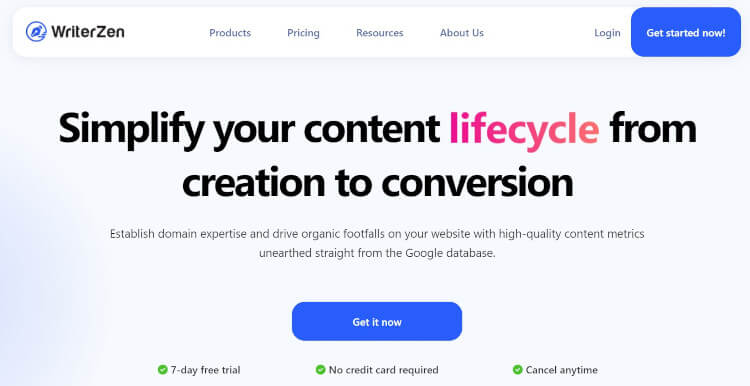
WriterZen is a content workflow tool suite for bloggers and SEO teams. It takes you through the content planning and creation process from start to finish, from keyword research to outlining, writing, and optimization. No guessing – just hard cold data.
WriterZen offers the following topic and keyword categorization features:
- The Keyword Explorer feature groups keywords with similar search intent to help you rank each article for multiple secondary terms.
- The Topic Discovery feature lets you create topic clusters and visualize them in mindmap view so you know exactly how to link each cluster topic page to your pillar page, increasing rankings for all the pages in that cluster.
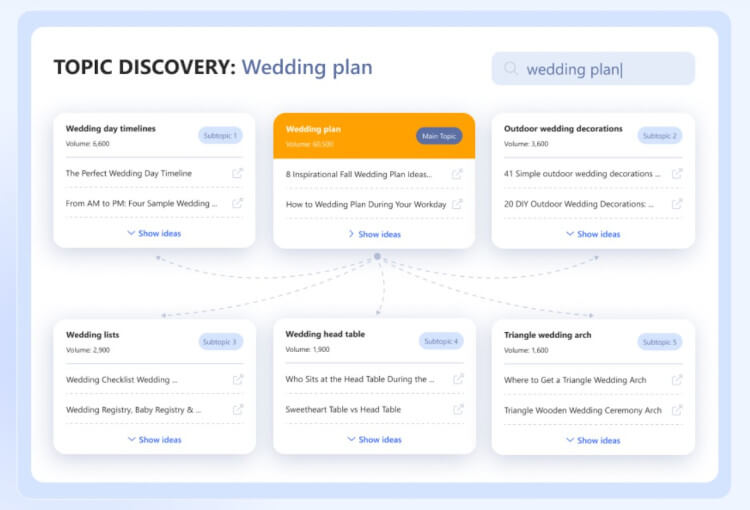
Highlights
- Build topical authority and get the perfect content architecture with hubs of related topics
- Input your seed keywords and get NLP entities with high salience scores to rank your articles higher
- Outline and create your content directly in the editor, optimized based on trends from top-ranked competitors
- Research and sort keywords based on ranking probability and sales potential
- Speed up the writing process with GPT-3 powered AI writing tools
- Get real-time content scoring and SEO analysis
- Easily collaborate with your writing team
Pricing: Plans start at $27 per month. WriterZen offers a seven-day trial, no credit card required.
Scalenut
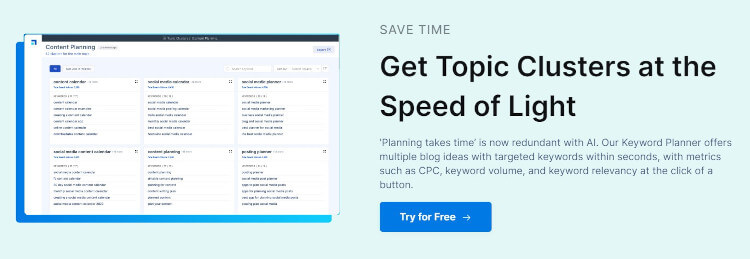
Scalenut is an AI-powered SEO content writing platform for bloggers, affiliate marketers, and marketing teams. It has everything you need to design a high-performing content strategy in seconds.
Scalenut’s Keyword Planner is a topic cluster generator and keyword grouping tool in one. It helps you a plan a hub of related articles around your pillar content to build topical authority. It then groups phrases with similar searcher intent to help individual articles rank higher.
Highlights
- Generate topic cluster ideas for your target location and get search volume, CPC, and relevancy metrics
- Quickly create content briefs by analyzing the outlines of top-ranked pages
- Rank your content higher with suggested NLP/semantic terms
- Audit, optimize, and update content with a real-time SEO score
- Scale content creation with AI copywriting tools and templates – create an article outline and have the AI “fill it in” in five minutes
- Determine ideal word count, header tags, FAQs, number of images, etc., for your articles based on SERP data
- Get most commonly asked questions for your articles from across platforms like Reddit
Pricing: Plans start at just $17 per month. There’s a seven-day free trial.
Surfer SEO
Surfer SEO is a platform for streamlining content production and on-page SEO. Its Keyword Research feature (formerly Content Planner) helps you research topic clusters that you can link together to create a “silo” and help Google rank those pages higher.
Plus, it also generates keyword clusters so you can target multiple phrases within each individual article.
Other useful features include a content editor with a real-time SEO score and auditing tool for quickly updating your existing content using the NLP entities that Google wants to see.
Surfer is overall an awesome set of tools for ranking your blog posts higher and is one of our top-recommended AI software for affiliate marketers.
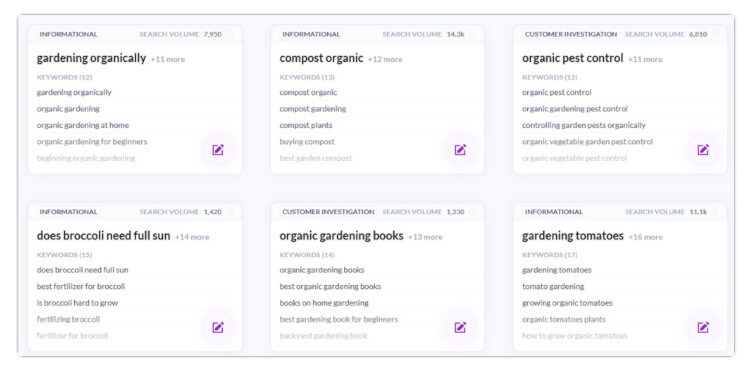
Highlights
- Instantly get dozens of keyword and topic cluster ideas, organized by competitiveness and search volume
- Filter topics by searcher intent, including local, informational, customer investigation, and shopping intent
- Avoid algorithmic penalties from over-optimization
- Connect to Search Console to identify clusters you could be ranking for but aren’t
- Create SEO-optimized content briefs and get a score in real time
- Audit and optimize existing content
- Integrate with Jasper, SEMRush, WordPress, and Google Docs
Pricing: Subscriptions start at $49 per month. There’s a seven-day money back guarantee.
Semrush
Semrush is one of the best all-in-one SEO platforms available (arguably in the top two, next to Ahrefs). It includes two primary features for creating topic and keyword clusters:
The Topic Research feature lets you generate subtopics for your seed keywords and develop powerful topic clusters in seconds. You can find out what topics are trending in a specific region and filter them by search volume and ranking difficulty.
The content gap feature lets you see what topics your competitors are ranking for and you’re not, so you can fill in any holes in your content plan.
The Keyword Magic feature is an advanced tool with the ability to create keyword clusters organized by searcher intent, search volume, CPC, difficulty, trend – even by how many organic results exist for your target keywords in the SERP, so you get a better sense of how competitive it is.
Highlights
- Create topic clusters and filter by location, rank potential, and search volume
- Get keyword clusters with in-depth metrics such as competitiveness, search volume, searcher intent, SERP features, and trending potential
- Get access to a comprehensive set of SEO tools for on-page and off-page optimization
- Create in-depth content briefs with suggested subtopics and FAQ for your content outlines
- Do a content gap analysis to find out what sites similar to yours are already ranking for
Pricing: Plans start at $99.95 monthly. SEMRush offers a free trial.
LowFruits
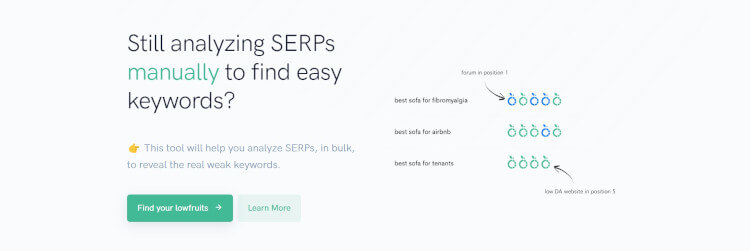
LowFruits is a genius and underrated tool that does one thing really, really well: finding hidden, easy-to-rank keyword clusters (“low-hanging fruits”).
Whereas other tools give you a keyword difficulty score (which you should always take with a grain of salt), LowFruits offers a set of features for analyzing the SERP in bulk, giving you a more accurate understanding of each keyword’s rank potential.
Highlights
- Group keywords with similar search intent
- Avoid cannibalism by knowing which keywords to target with one blog post
- Increase your chances of ranking for many queries with one article
- Use wildcards to find specific keyword combinations
- Find weak spots in the SERP (e.g., where low-DA sites and sites like Reddit are ranking on first page)
Pricing: LowFruits starts at $25 per month. Sign up and get 10 free credits, no credit card required.
SE Ranking
SE Ranking is all-in-one SEO software with a built-in Keyword Grouper feature that lets you check search volumes, filter by language and location, and adjust a variety of other settings.
Other features of the platform include rank tracking, website audit, competitor analysis, backlink checker, and on-page optimization. For agencies, white label SEO tools are also included.
Highlights
- Group keywords quickly and accurately
- Get access to the complete SEO tool suite when you subscribe, including social media management, content marketing, and analytics
- Track your rankings
- Generate competitor research reports
- Audit your website
- Monitor your backlinks and competitors’ backlinks
- White label SEO reporting for agencies
Pricing: SE Ranking has plans starting at $23.52 a month.
NeuralText
NeuralText is a set of SEO and AI writing tools for marketers and content managers. It automates much of the content creation and optimization process, letting you write fully optimized articles in half the time.
NeuralText’s Keyword Clustering tool draws from SERP data to group keywords with similarly ranked URLs. Using it, you can generate detailed keyword lists with search volume, CPC, difficulty, and trend data.
An aside: If you’re already familiar with tools like Jasper, Frase, and Clearscope, you’ll want to check out NeuralText, as it provides similar functionality at a lower cost.
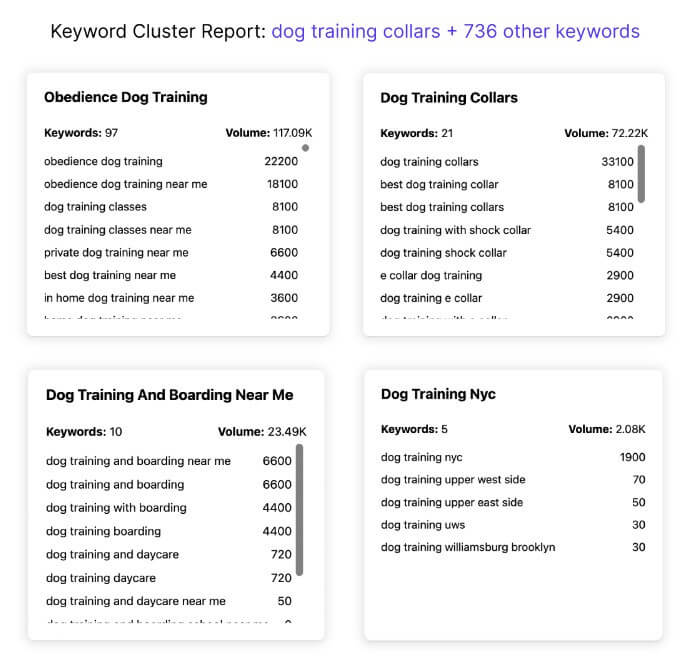
Highlights
- Get the exact keywords you need to rank a page for hundreds of long-tail phrases
- Determine whether a keyword group should go in one article or be targeted individually in multiple articles
- Import data from Ahrefs and SEMRush
- Create detailed, SEO-optimized briefs for your content writers
- Build out fully optimized blog posts in a Google Docs-style editor
- Get instant suggestions for how to optimize your content, including suggested word count and keyword phrases, based on SERP data
- Generate multiple variations of content using the AI copywriting assistant
- Integrate with Google Docs, Shopify, and WordPress (coming soon)
Pricing: NeuralText starts at just $19 per month. You can trial the software for five days for just $1.
Serpstat
Serpstat is a complete SEO platform used by brands like Shopify, Samsung, and Uber, and endorsed by marketing experts like Neil Patel and Brian Dean of Backlinko. It has a robust clustering tool that groups keywords based on semantics as well as searcher intent.
Highlights
- Filter keywords by weak, medium, or strong Connection Strength
- Create groups of up to 50,000 connected keywords
- Select a preferred region for your cluster data
- Avoid cannibalization by distributing semantics properly among your pages
Pricing: Serpstat offers plans from $55 a month. They have a seven-day trial.
Why are topic and keyword clusters important?
Topic clusters offer the following benefits:
- Helps your site become an authority in the eyes of Google by covering a topic comprehensively across the domain, resulting in higher rankings whenever you publish any content related to that topic
- Provides many opportunities to interlink closely related pages on your site, distributing link juice and ranking the entire cluster higher
Keyword clusters, on the other hand, offer these benefits:
- Increases an article’s potential to rank for many secondary keyword phrases, increasing the amount of traffic you get from that single article
- Helps your article cover a topic in depth, providing a better experience for your readers
How to create a topic cluster
To create a topic cluster, you need:
- A pillar article. This is usually a long-form article targeting an important (a.k.a. “cornerstone”) and usually high-traffic keyword on your website. An example might be an ultimate guide to the keto diet targeting the search query “what is the keto diet.”
- Subtopics for your cluster. This is a group of articles that cover aspects of your pillar or parent articles in more detail. In this case, it would make sense to use our examples from above: “benefits of keto diet”, “keto diet side effects”, “is keto good for diabetics.”
- Internal links. A topic cluster strategy wouldn’t work without the magic ingredient – internal links. You’ll want to link from all of your subtopics to your pillar content and vice versa to help Google understand the connection (you can automate this using Link Whisper). This is why topic clusters are sometimes called the “hub and spoke” or “silo” method, because you’re mapping together, or compartmentalizing, related articles on your site.
The best way to choose topics for your cluster is to use software with a topic clustering feature. These tools pull data from the SERP, equipping you with the information you need to create powerful clusters that rank.
What is the best free keyword cluster tool?
The AIPRM for ChatGPT Chrome extension is one of the best free online tools for generating keyword and topic clusters.
Summing up
As you can see, many keyword clustering tools are built-in features of a larger SEO software suite. To get a sense of the best solution for your business, make a list of all the features you need in an SEO platform and then take advantage of the free trial offered by many of these tools.






